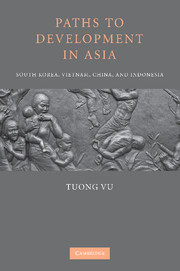Book contents
- Frontmatter
- Contents
- List of Tables and Figure
- Acknowledgments
- List of Abbreviations
- 1 State Formation Dynamics and Developmental Outcomes
- PART ONE DIVERGENT NATIONAL PATHS OF STATE DEVELOPMENT
- PART TWO VARIANTS OF ACCOMMODATION: VIETNAM AND INDONESIA COMPARED
- 6 Organizing Accommodation in Vietnam: Coalition Government, United Front, and Leninist Party
- 7 Organizing Accommodation in Indonesia: Parliament and Status-Based Parties
- 8 Talking Accommodation in Vietnam: Nation, the People, and Class Struggle
- 9 Talking Accommodation in Indonesia: Nation, the People, God, and Karl Marx
- 10 Rethinking Developmental States
- References
- Index
9 - Talking Accommodation in Indonesia: Nation, the People, God, and Karl Marx
Published online by Cambridge University Press: 04 August 2010
- Frontmatter
- Contents
- List of Tables and Figure
- Acknowledgments
- List of Abbreviations
- 1 State Formation Dynamics and Developmental Outcomes
- PART ONE DIVERGENT NATIONAL PATHS OF STATE DEVELOPMENT
- PART TWO VARIANTS OF ACCOMMODATION: VIETNAM AND INDONESIA COMPARED
- 6 Organizing Accommodation in Vietnam: Coalition Government, United Front, and Leninist Party
- 7 Organizing Accommodation in Indonesia: Parliament and Status-Based Parties
- 8 Talking Accommodation in Vietnam: Nation, the People, and Class Struggle
- 9 Talking Accommodation in Indonesia: Nation, the People, God, and Karl Marx
- 10 Rethinking Developmental States
- References
- Index
Summary
THE IRONY OF HISTORY
When the nationalist movements of Vietnam and Indonesia are compared in terms of leadership and discourses, an intriguing irony emerges. Concerning leadership, the Vietnamese movement was dominated by a communist party, whereas nationalists and Muslims led in Indonesia. When we turn to movement discourses, a reverse situation is found. The previous chapter has shown that formulations commonly associated with leftist discourses, such as social justice and class struggle, were suppressed in Vietnam until the late 1940s. Ho Chi Minh did not breathe a word about social justice, socialism, or class struggle in his oft-cited Declaration of Independence. Even in 1950, top Vietnamese communists still had reservations about these themes, indicating their lack of legitimacy. In this chapter, we find that radical leftist discourses dominated the Indonesian movement in the same period. Even Islamic parties such as Masjumi, the largest political party, professed a belief in “socialism” and called its ideology “religious socialism.” Smaller but radical communist parties such as Tan Malaka's Murba Party never failed to proudly proclaim their allegiance to Marx. Despite having a nationalist and Muslim leadership, everything other than “socialism” lacked legitimacy in Indonesia.
What explains this irony? Why did this mismatch occur between movement leadership and discourses, and what is the significance of this mismatch? We have seen in the preceding chapter that “the nation” dominated the Vietnamese anticolonial movement from day one. In contrast, Marxist and populist discourses were popular early in Indonesia, long before native elites started calling themselves “Indonesians.”
- Type
- Chapter
- Information
- Paths to Development in AsiaSouth Korea, Vietnam, China, and Indonesia, pp. 208 - 233Publisher: Cambridge University PressPrint publication year: 2010

